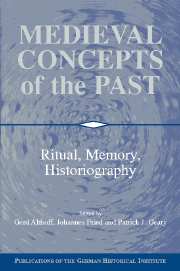Book contents
- Frontmatter
- Introduction
- 1 Authority and Legitimation of Royal Policy and Action: The Case of Henry II
- 2 King Henry II of Germany: Royal Self-Representation and Historical Memory
- 3 The Variability of Rituals in the Middle Ages
- 4 Rebels and Rituals: From Demonstrations of Enmity to Criminal Justice
- 5 Oblivion Between Orality and Textuality in the Tenth Century
- 6 Text and Ritual in Ninth-Century Political Culture: Rome, 864
- 7 The Concept of Time in the Historiography of the Eleventh and Twelfth Centuries
- 8 Constructing the Past by Means of the Present: Historiographical Foundations of Medieval Institutions, Dynasties, Peoples, and Communities
- 9 Topographies of Memory: Center and Periphery in High Medieval France
- 10 Challenging the Culture of Memoria: Dead Men, Oblivion, and the “Faithless Widow” in the Middle Ages
- 11 Artistic and Literary Representations of Family Consciousness
- 12 The Strange Pilgrimage of Odo of Deuil
- 13 The Rhineland Massacres of Jews in the First Crusade: Memories Medieval and Modern
- 14 The Martyr, the Tomb, and the Matron: Constructing the (Masculine) “Past” as a Female Power Base
- Index
Introduction
Published online by Cambridge University Press: 05 January 2013
- Frontmatter
- Introduction
- 1 Authority and Legitimation of Royal Policy and Action: The Case of Henry II
- 2 King Henry II of Germany: Royal Self-Representation and Historical Memory
- 3 The Variability of Rituals in the Middle Ages
- 4 Rebels and Rituals: From Demonstrations of Enmity to Criminal Justice
- 5 Oblivion Between Orality and Textuality in the Tenth Century
- 6 Text and Ritual in Ninth-Century Political Culture: Rome, 864
- 7 The Concept of Time in the Historiography of the Eleventh and Twelfth Centuries
- 8 Constructing the Past by Means of the Present: Historiographical Foundations of Medieval Institutions, Dynasties, Peoples, and Communities
- 9 Topographies of Memory: Center and Periphery in High Medieval France
- 10 Challenging the Culture of Memoria: Dead Men, Oblivion, and the “Faithless Widow” in the Middle Ages
- 11 Artistic and Literary Representations of Family Consciousness
- 12 The Strange Pilgrimage of Odo of Deuil
- 13 The Rhineland Massacres of Jews in the First Crusade: Memories Medieval and Modern
- 14 The Martyr, the Tomb, and the Matron: Constructing the (Masculine) “Past” as a Female Power Base
- Index
Summary
Although scholarship in general and historical scholarship in particular claim to be universal and international in their scope and methodology, national traditions, methods, and foci have developed in many fields, including medieval history. These national patterns have done little to encourage mutual cooperation and understanding: On the contrary, they often have been a real hindrance. Such obstacles, already observable in the nineteenth century, were made even more insurmountable by European political developments in the twentieth century. Two world wars, with their attendant alliances and oppositions, have made their contributions to deepening divisions and to complicating understanding and collaboration. These divisions have been particularly operative in American and German scholarship on medieval Europe.
A century ago, medieval historical studies in America were dominated by themes and methodologies developed in Germany. This influence was part of the more general influence exercised by German universities on American scholarship. Regardless of field, American historians looked to Germany for training, for inspiration, and for models of historical interpretation. For a variety of reasons, the investigation of which would take us far beyond the topic of this book, these close contacts dissolved in the course of the twentieth century.1 World War I and its wave of anti- German sentiment in North America was certainly a major factor. So, too, was the general reaction in medieval German historiography against the integration of the social sciences into historical discourse, particularly in the 1920s and 1930s.
- Type
- Chapter
- Information
- Medieval Concepts of the PastRitual, Memory, Historiography, pp. 1 - 18Publisher: Cambridge University PressPrint publication year: 2002

